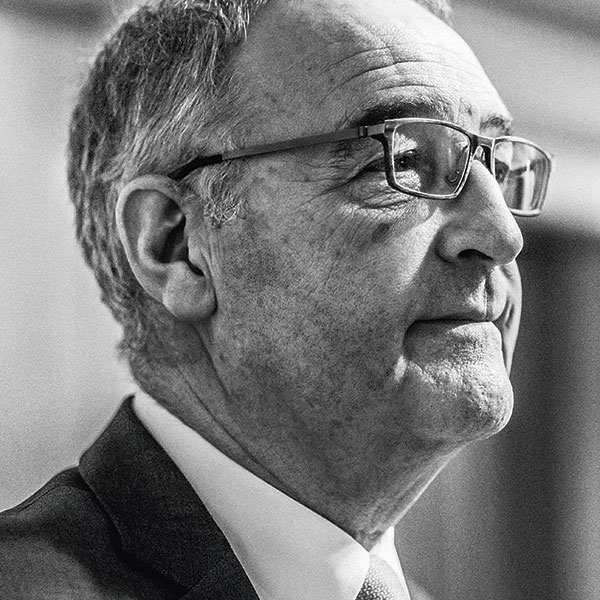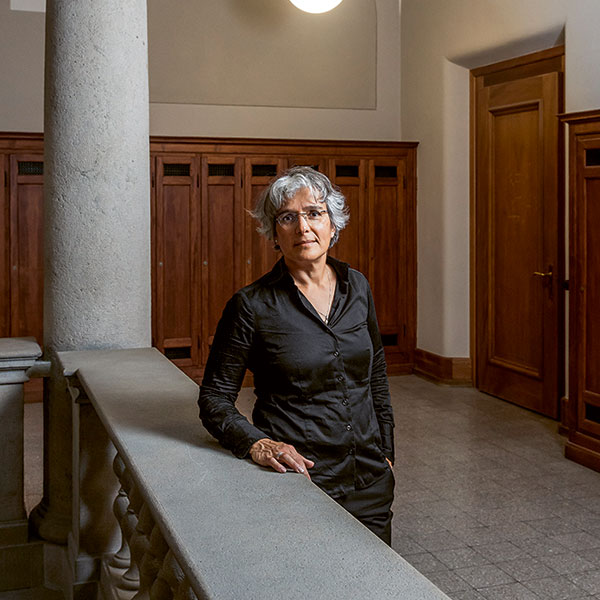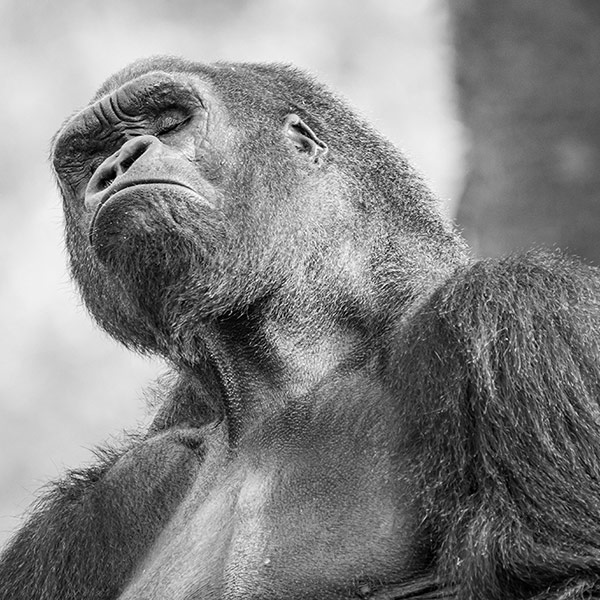Lateral entry into research
There aren’t many researchers who’ve chosen a lateral point of entry into their field. And even here, men are still in the majority. If you start an academic career later in life, you often have to overcome very specific hurdles. But your previous experience can also help you to find your place in the world of academia. Five men and women talk about their move into research.
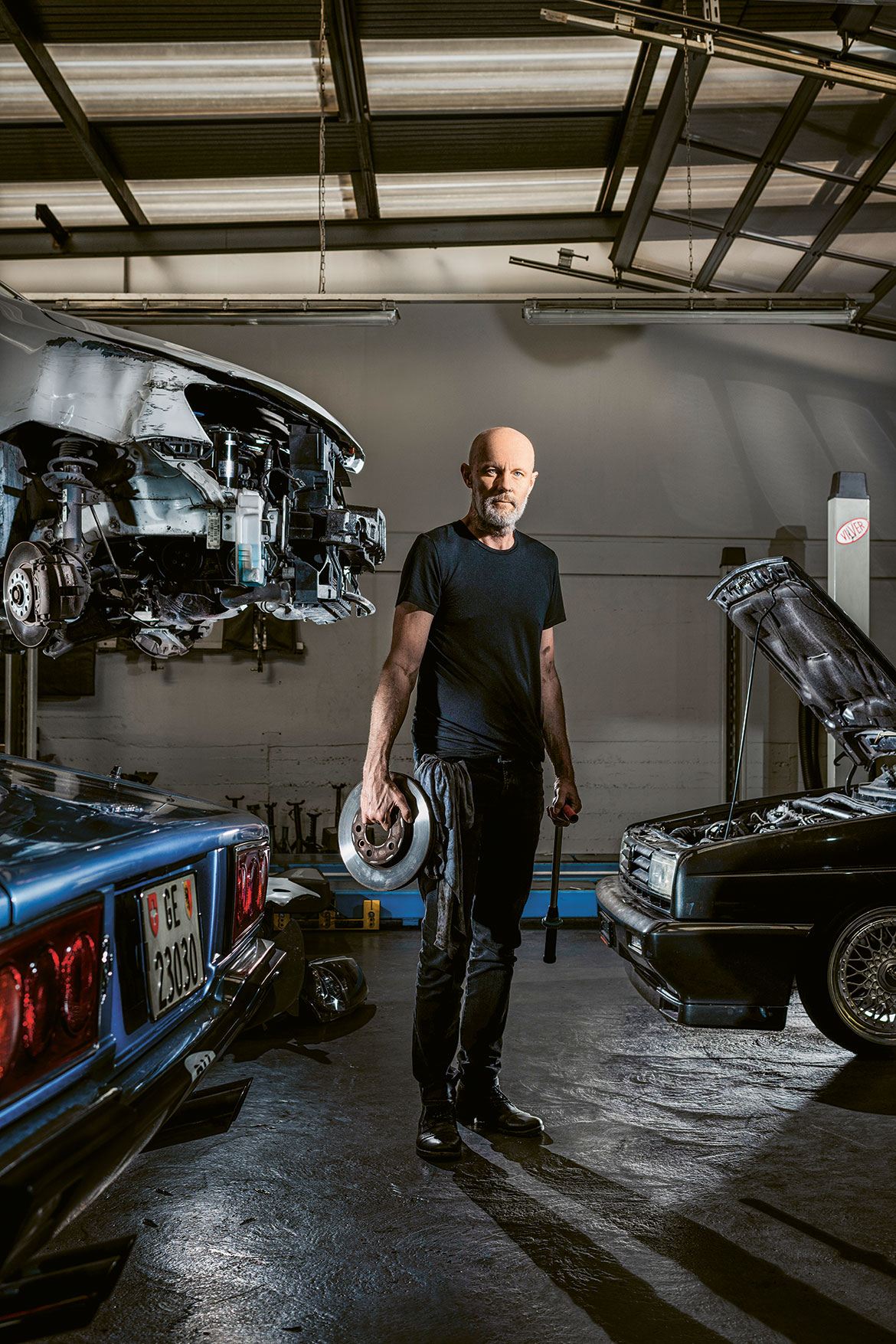
Robert Thew, quantum physicist, University of Geneva | Image: Fred Merz | Lundi13
FROM AUTOMOTIVE MECHANIC TO QUANTUM MECHANIC
“Not being a professor doesn’t bother me at all”
“I grew up in Australia, in a working class family. I left school at the age of 15 on an apprenticeship as a car mechanic. I played Australian-rules football in the first junior league and started several rock bands. At 24, I was managing a team in a Volvo garage. But there was little chance of career progression and the pay was low. I thought I should get better training. So I went into adult education, then studied at the University of Queensland. My partner also went to university. We had a small child; it was tight financially, but student grants helped us.
It worked well. I discovered that I liked physics, despite never having succeeded in math at school. I met renowned scientists in the field of quantum information, including Gerard Milburn and Michael Nielsen. It gave me the drive to get started. I was attracted to European culture and at the University of Geneva I knocked on the door of Nicolas Gisin, known for his work in quantum cryptography. I was already 33 years old, but he took me on as a doctoral student. He told me he liked the fact that I played a lot of Australian-rules football: for him, it indicated a team player who is committed and takes responsibility.
We sold everything and bought oneway tickets to Switzerland. We arrived on a Saturday; on the Monday, our 10-year-old son started school without knowing a word of French. After my doctorate, I was able to stay in Geneva. I was relieved at not having to move again at 38 with my family to do a postdoc abroad.
I have been working in this group for almost twenty years. I conduct my research on quantum entanglement and at the same time coordinate projects, such as our role in the European Quantum Flagship program. That’s a job that many scientists don’t like, but it’s fine for me. I was in Washington last week discussing our work with funding agencies. People often think I’m a professor, but it doesn’t bother me that I’m not. As a child, I would play football on the same day in teams for 11, 13 and 15 year olds. I was the tallest player in one and the shortest in another. It taught me two things. First, that I’m able to adapt. Secondly, that in a team, everyone can contribute - whatever their age or whatever talents they may have. (ds)
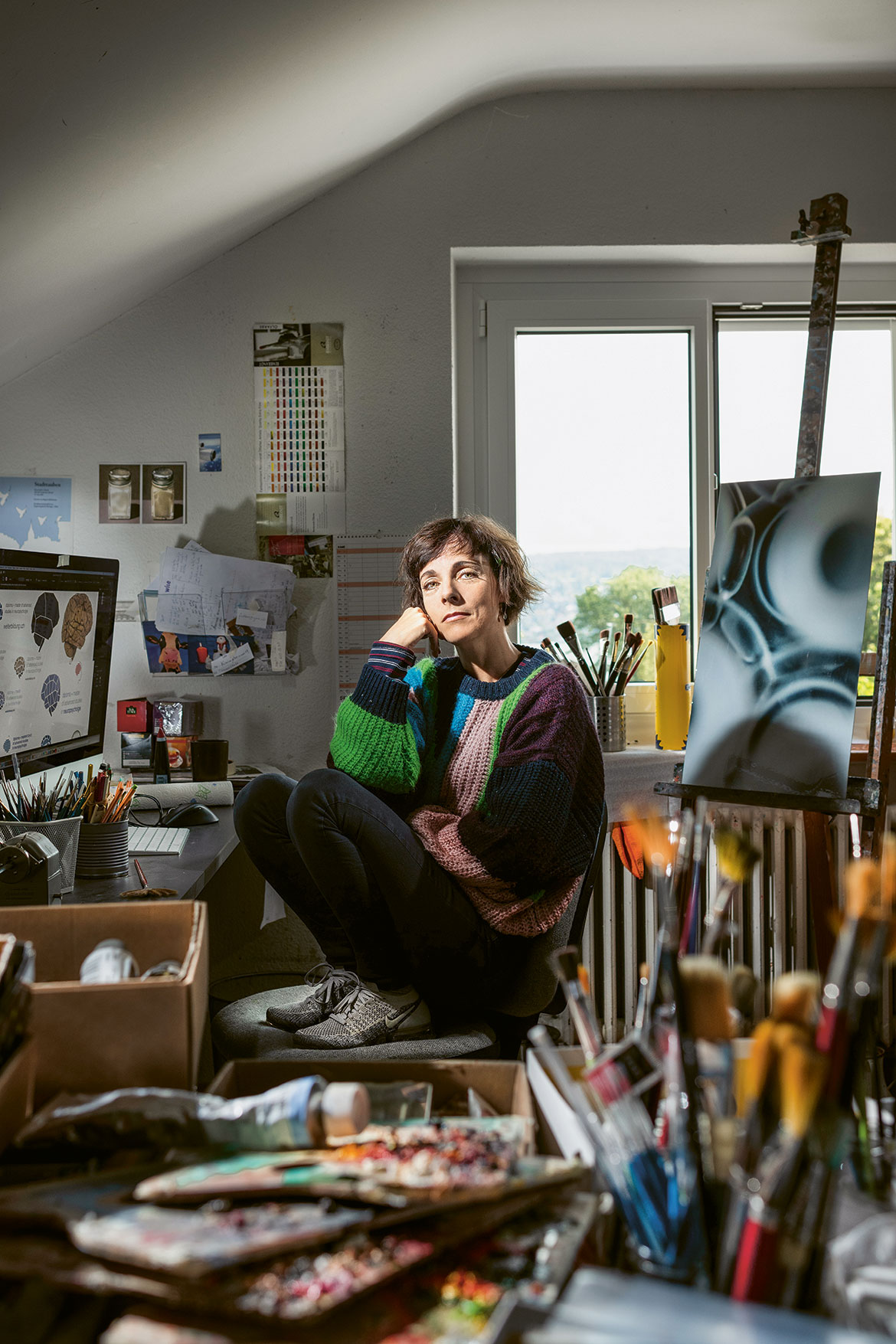
Isabel Hotz, neuroscientist at the University of Zurich | Image: Fred Merz | Lundi13
THE AESTHETIC WITHIN US
“I firmly believe that you should fulfil your life’s career dreams”
“I was already doing research as a little girl. Back then, I’d paint the shells of snails in different colours in order to find out if and when they might cross my path again. The experiment was not particularly successful, but it certainly awakened my passion for observing nature. Even though I came to my present career as a neuroscientist by way of a circuitous route, every station along the way had some connection to my current work.
“I got into medicine through my apprenticeship as a medical assistant, right after secondary school. But everyday life in a doctor’s practice didn’t offer much responsibility, and it didn’t suit me. So I did the high school exams I needed for university entrance, and then trained as a graphic designer. I worked for eight years in the profession, both on my own and in a design office. And the visual aspect is still important in my research today. For my doctorate here at the Institute for Neuropsychology at the University of Zurich, I analyse MRI images of brains. The images are of the brains of elderly, healthy people. They show different stages of so-called white matter hyperintensities and silent lacunes, both of which are forms of cerebral microvascular disease, and which point to changes in the small vessels of the brain. One of the things I’m interested in is the kind of strategies that these people use to compensate for the deficiencies that we see on the images.
“I firmly believe that you should try and fulfil your life’s career dreams. The fact that I’m a bit older than normal in my scientific career also has its advantages, especially as a woman. When I began studying, my two children were already seven and nine years old, so they’re now at an age where it doesn’t matter to them if I have a long working day. I love my work. There are no distant countries left for us to discover any more, but with the human brain we can travel into an as-yet unknown cosmos”. (ab)
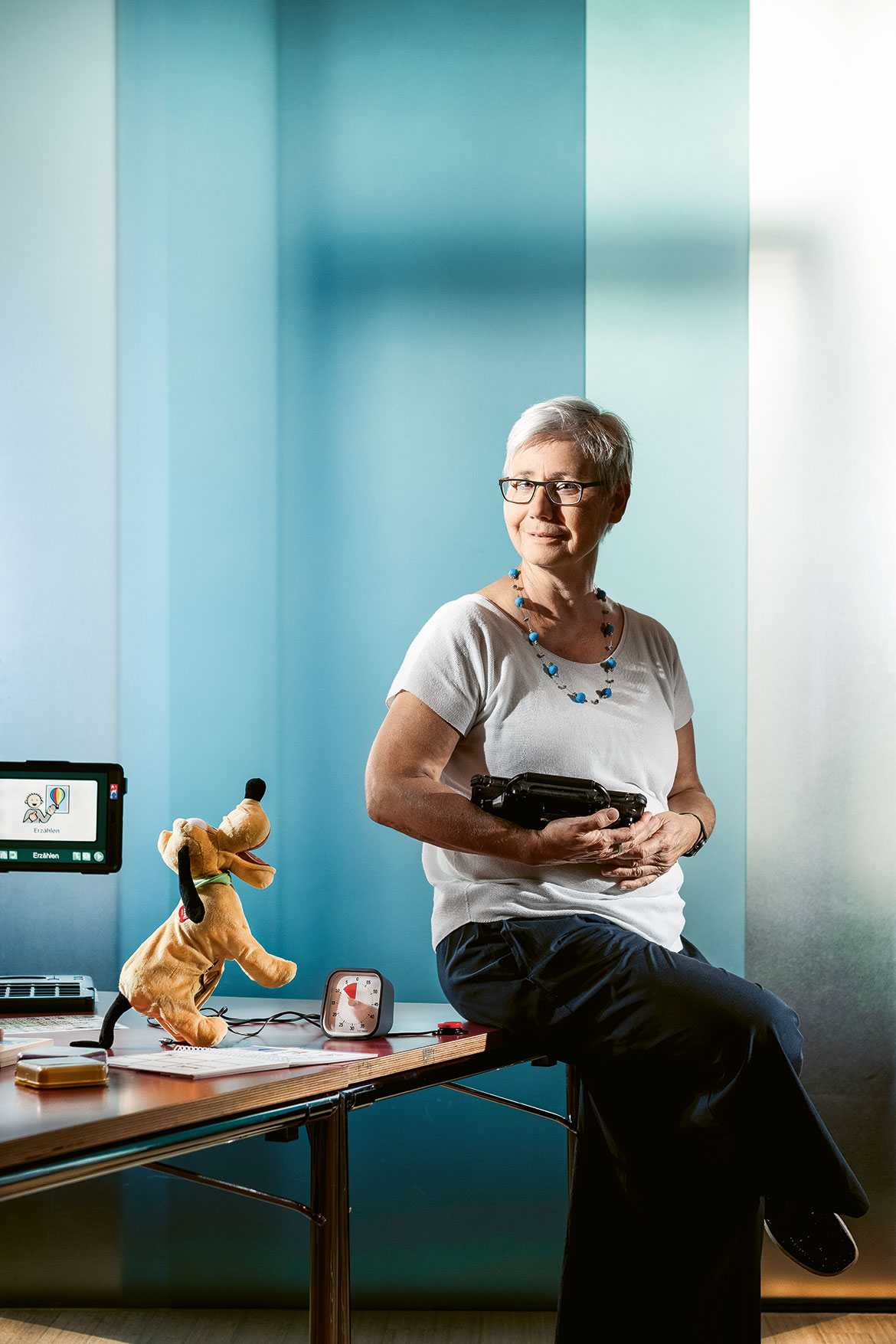
Gabriela Antener, lecturer at the FNHW | Image: Fred Merz | Lundi13
PLAIN LANGUAGE GIVES WAY TO COMPLICATED ADMINISTRATIVE COMMUNICATION
“I was already over 40 when I changed sides”
“In my research field, I can really profit from my earlier professional experience. It gives me a close connection to the practical world, which is very valuable here at FHNW, where we engage in applied research. I originally studied special needs education, and after finishing my degree I decided to go into the practical side of things. Together with colleagues, I founded a consultancy and further-education company for augmentative and alternative communication (AAC). That was a new field back then. It is used for people whose communicative skills are impaired because of illness or disability. They are unable to communicate adequately with the usual means, and so need alternatives such as signs, a synthesised voice or an alphabet board.
I was always fascinated by research, and when the universities of applied sciences were established, it gave me a unique opportunity. I’m a lateral entrant, but in my case ‘lateral’ primarily means ‘late’, because I was already over 40 when I changed sides. My former field of practice still has an impact on my research activity today. I am especially interested in how people with impairments can be helped to participate more easily in everyday life. In one of our projects, for example, we’re researching how the authorities communicate with people who have disabilities. We want to be able to make recommendations as to how those affected can participate better, and dismantle barriers to communication.
One advantage from my previous career is that I still have a broad network of people who are active in practice. So I hear what’s happening and what’s topical at the moment. I also keep a connection to the practical side of things through projects in Mongolia. For several years now, I’ve been supporting an NGO there that offers all kinds of help for children with severe disabilities. (ab)
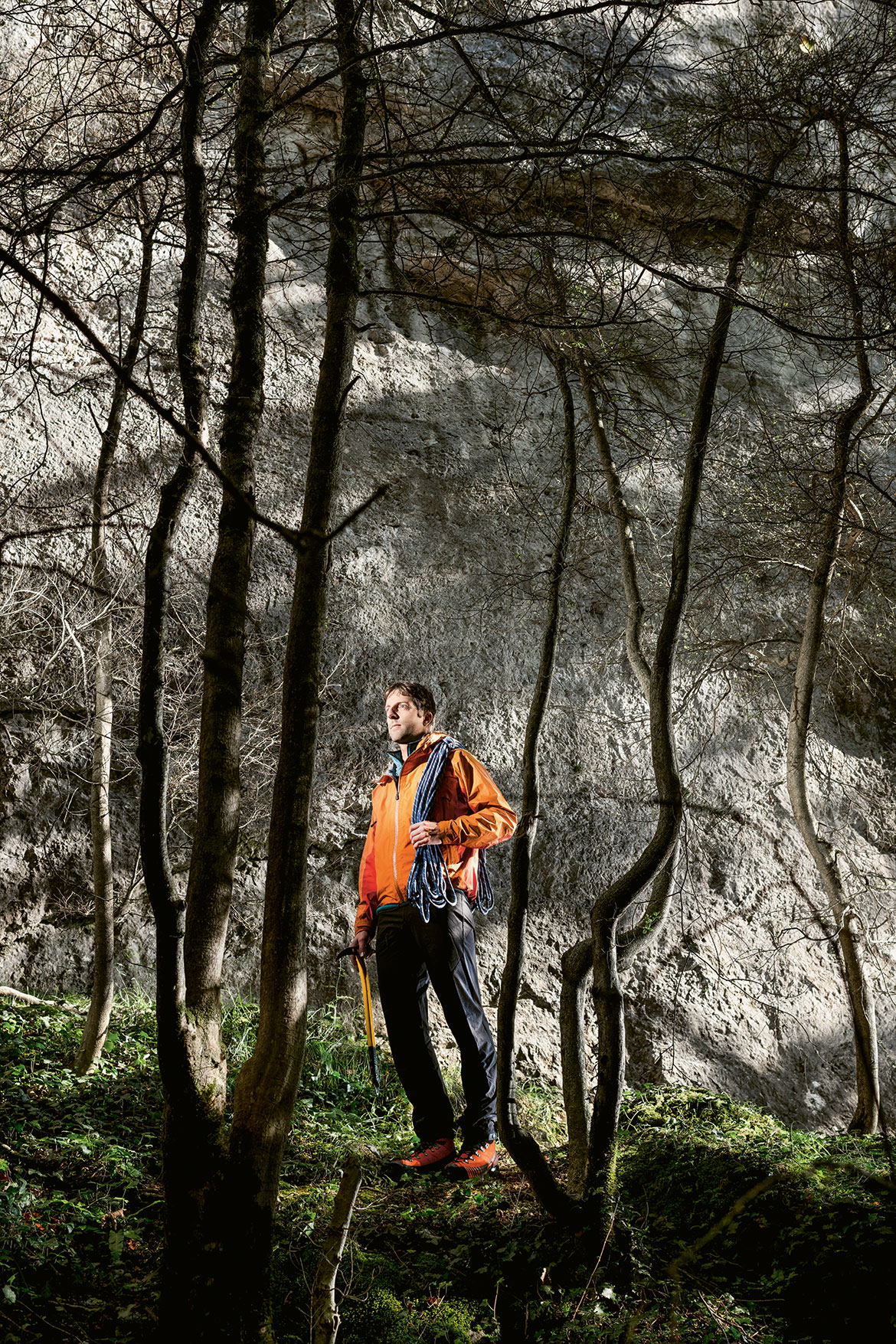
Augustin Fragnière, environmental philosopher, University of Lausanne | Image: Fred Merz | Lundi13
THE PHILOSOPHER MOUNTAIN GUIDE
“My experience in the mountains has given me a more global vision of science”
I have a rather intellectual profile. I’ve always been fascinated by science, reading and history, but as a teenager, I caught mountain fever. I’d grown up between Lausanne, where I went to school, and Valais, where my father, who was a guide, took me on hikes. I climbed my first 4,000-meter summit at the age of 13. I also studied literature and passed the mountain guide certificate, leading me to my first profession. I liked the magnificent landscapes, but above all it was about the human relationships with clients from totally different backgrounds. It had a huge influence on me: managing groups, assuming responsibility, making difficult decisions, keeping calm, anticipating.
After five years of that, I wanted to return to the world of ideas. I had become fascinated listening one day to a former school friend tell me about his research in oceanography. So I took a second Master in environmental sciences. Then there was an encounter with the philosopher Dominique Bourg, which left its mark on me. I continued on to a doctorate on our conceptions of freedom and their influences on our relationship with nature. I took my family to Seattle for a two-year postdoc. Since our return, I have been juggling research and project coordination, first for the thinktank foraus, now for the new Interdisciplinary Centre on Sustainability at the University of Lausanne. But my priorities remain getting a professorship and seeking the funds to conduct research.
The years I spent as a guide meant being out of sync with academic-career progression: a second postdoc abroad was out of the question for my family. But with what I did achieve, I gained a more global vision of science, its challenges and its purpose. For me, science cannot be isolated, but must play an active role in society. This can be seen in my research: I practise philosophy, but in a very applied way”. (ds)
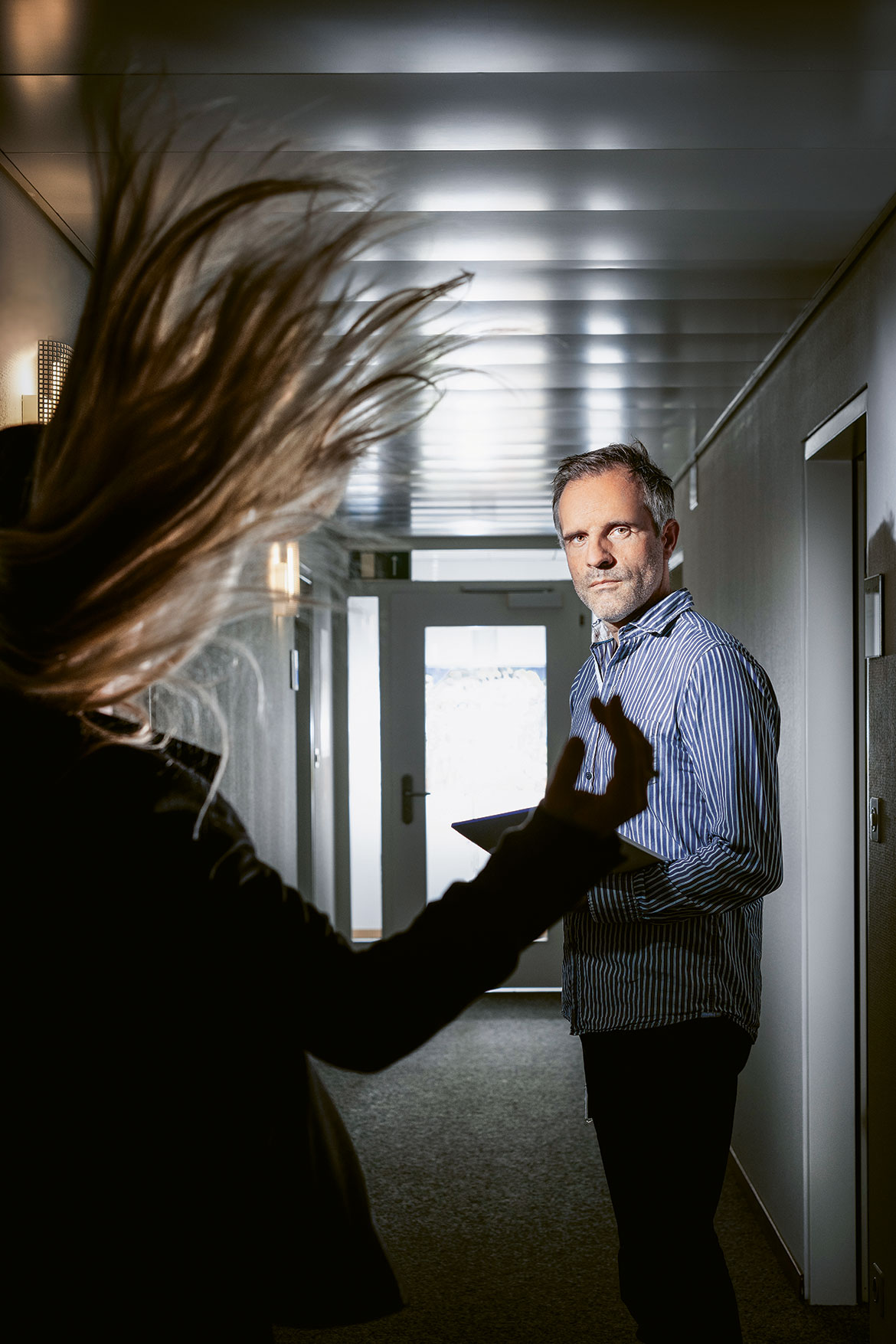
Christian Burr, nursing scientist at the Centre for Clinical Nursing in Bern | Image: Fred Merz | Lundi13
WITH HAND AND HEART AND MIND
“With this kind of commitment, your career soon becomes your life”
“As an elite amateur mountain biker, I was a late entrant without any success. In my current profession, however, my late entry has been successful. I took my Master in nursing science at the Bern University of Applied Sciences at the age of 41, where I was top of my class. I already had many years of professional experience in nursing. Unlike most of my fellow students, I was already married with kids. My daughter was eight at the time, my son 12. Then I decided I wanted to do a doctorate. That’s not really possible in Switzerland, but it’s different in Germany. The University of Vallendar near Koblenz has a nursing faculty, and they accepted me into their doctoral programme, despite my having a Master from a university of applied sciences, and despite my age.
“I originally wanted to become a physiotherapist, but I didn’t get accepted, and so I landed in nursing. My key experience in training happened during an internship in psychiatry. I thought to myself: Wow, that’s it! Working face to face with people! After my training, I did my community service in lieu of the military, and was sent to work on a heroin prescription programme for drug addicts. The aim of the programme was to help people achieve stability and a certain quality of life, and only then to help them cure their addiction. Since then, I have co-authored several publications on the topics of drug recovery and mental health.
“For my doctorate at the University of Vallendar, I’m doing research at the Bern University Clinic. It’s a pilot study on the topic of hearing voices. I’ll be dealing with the everyday experience of people who hear voices – those affected talk to me about their experiences and about their search for quality of life. As for my own quality of life: with this kind of commitment, your career soon becomes your life. So it’s all the more important to have quality of life in your family”. (fs)

